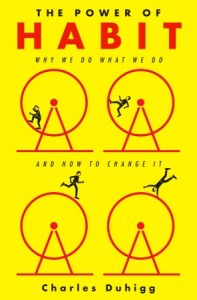 There was a copy of this book lying on a coworker’s desk that I just happened to pick up while waiting for a meeting to start. It intrigued me. Duhigg’s a smart writer — he knows a good hook (as any good journalist does), and The Power of Habit does what any great narrative nonfiction should, presents a case, argues it relentlessly, and gives the reader some food for thought. The book opens with some fascinating science around how the brain builds habits, and what that might look like ‘under the hood’ (so to speak) of someone who had managed to drastically change their life. The point, I think, that Duhigg wants to make is simple: we, as humans, are hard wired to form habits, and that wiring, once it’s there, remains really hard to break.
There was a copy of this book lying on a coworker’s desk that I just happened to pick up while waiting for a meeting to start. It intrigued me. Duhigg’s a smart writer — he knows a good hook (as any good journalist does), and The Power of Habit does what any great narrative nonfiction should, presents a case, argues it relentlessly, and gives the reader some food for thought. The book opens with some fascinating science around how the brain builds habits, and what that might look like ‘under the hood’ (so to speak) of someone who had managed to drastically change their life. The point, I think, that Duhigg wants to make is simple: we, as humans, are hard wired to form habits, and that wiring, once it’s there, remains really hard to break.
There’s this lovely trend in nonfiction writing these days, authors like Gladwell, Pollan, etc., whose easy, chatty, often-almost breezy style does well by its subject matter. If this were a dry, annotated, intense look at the physiology of the brain and how it maps habits, etc., I doubt I would have gotten passed the first page. Instead, Duhigg presents a case study of a person we all wish we could be — someone who has taken charge of her life, lost the weight, given up the bad habits, and turned herself around. Everyone, EVERYONE, wants to be that person. Radical change being an impossibility in terms of anyone’s practical life, Duhigg looks at how by changing a few simple habits, making your world slightly different in the moments before your brain recognizes the habit, people can improve just about any facet of their everyday existence.
This was the part of the book that I took most to heart. It’s got me thinking and humming a lot over the last couple weeks. Of course, as I do with everything, I take it to a whole other personal level. Over the last 18 months since having the RRBB, our lives have been in flux, sure he’s got a very habitual schedule, and babies love routines, but his schedule, his habits, were nothing like my own, and it’s been an upward challenge adapting my life to meet his needs, his wants, the way his brain is developing. It’s no wonder we’ve been feeling so out of place — my brain has spent years developing the particular habits, unhealthy or not, and then along comes this adorable, squishable, delightful little creature who throws all of that out of whack. So, like Duhigg suggests, I’m making change easier in my life, which is where that whole small steps, small change “revolution” idea came from (yes; I ripped it off from him!). And while it’s only been a couple of weeks, it’s actually working.
The second part of the book that I was most fascinated by was the business analysis of how Target utilizes customer data; it was so engrossing, and so relevant to those of us in a digital marketplace. It really got me thinking about how lucky companies like Amazon, Kobo, Google, etc., are to have the kind of consumer insight that comes from not only seeing sales figures, but general web traffic, usability, paths through their sites, abandon rates, open rates, all that great stuff. Imagine if they shared it openly with publishers (I know we can pay for access to some of it) — how would that influence how we build covers, what we publish, etc. All in all, it’s really captivating stuff — and I enjoyed this book immensely.